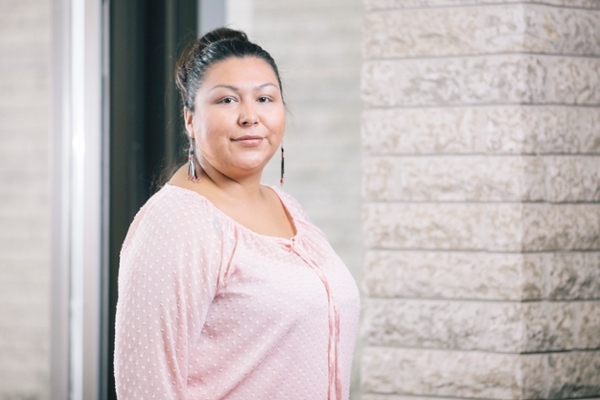
Building capacity in First Nations organizations
After a decade of using her knowledge and skills to build capacity in First Nations organizations, Nicole Callihoo faced a turning point. If she wanted to achieve more as an administrator in a non-governmental organization (NGO), she needed to know more. In 2012, she left a good job to enroll in the Master of Public Administration (MPA) program at Johnson Shoyama Graduate School. Just three years later, she is manager of Education and Operations for the Ottawa-based First Nations Health Managers Association.
By Bev Fast, Saskatoon-based freelance writerBack Story
Nicole used a degree in Native Studies from the University of Alberta to launch her career in 2002. She started in Vancouver, creating industry training programs for Aboriginal people. A year and a half later, she became assistant executive director at the Alberta Native Friendship Centres Association.
A talent for managing people and working with both government and industry led to other career opportunities. In 2004, Nicole moved to Ottawa to take up the reins as program manager of the National Association of Friendship Centres (NAFC). The next seven years saw her manage a growing staff and national programs in excess of $26 million.
“It was a full plate,” Nicole said, reflecting back on those years. “We negotiated with government for programs and services, we assisted with the administration of those programs and services, we worked with partners, we helped administer funds. Essentially, we made sure Friendship Centres across Canada had what they needed to do their work on the ground.”
In 2011, Nicole became the NAFC’s senior programs advisor—a position she held until 2012, when she moved west to attend Johnson-Shoyama.
The Need to Know More
With her career going well, the decision to step away and pursue a master’s degree was not an easy one. “What motivated me was pure frustration,” Nicole said. “I was frustrated with trying to work with government bureaucracy. I needed more knowledge and expertise so I could understand the challenges I was experiencing.”
Nicole jumped into the MPA program with both feet, enrolling full-time, taking a full course load and participating in projects. She even managed to squeeze in part-time work, as a research and policy analyst for the Aboriginal Friendship Centres of Saskatchewan in the summer of 2013, and as a research assistant during the fall of 2013. Despite the busy schedule, she completed the program in 18 months, with an 82.1% GPA.
Getting Involved
But it wasn’t all books and studying—a passion for being involved and building community is deeply rooted in Nicole. “I was very active in campus groups. I was an academic counsellor and Aboriginal liaison with the Graduate Students Association (GSA) at the University of Saskatchewan, and I chaired the Aboriginal & Indigenous Graduate Student Council (AIGSC) for two years.”
As part of the AIGSC executive, Nicole focussed on getting the group going and getting more students involved. “When you’re at the graduate level in university, you see fewer Aboriginal faces, so it was great to have a space where we could support each other,” Nicole said. “At first, people on campus didn’t seem to know or care about us, but as we went along, we built a community and had more people coming to meetings. I really enjoyed being part of that.”
Nicole was also a member of the silver medal winning JSGS team at the 2013 National Public Administration Case Study Competition, held at Queen’s University in Ontario. She and teammates David Cundall, Dominic French and Julene Restall competed against nine teams from policy schools across Canada.
“I would really encourage anyone to get involved in campus activities and groups. I know it’s harder if you’re working full time, but it helps bring out your skills and build your confidence. It’s a great social outlet, too. For me, the best thing was that I was part of decision-making bodies, so I was actually doing what I was being taught.”
Putting JSGS to Work
After graduation, Nicole returned to Ottawa to restart her career. After a three-month search, she found a fit as program administrator for the First Nations Health Managers Association (FNHMA). Three months ago, she was promoted to manager of education and operations. As part of its mission to expand health management capacity for First Nations, the FNHMA is taking a leadership role in developing and promoting quality standards, practices, research, certification, networking and professional development.
“We’re growing and hiring new staff, opening offices, updating our curriculum—it’s an exciting time, and I’m working to ensure that we continue to function smoothly and deliver on our programs amid the changes,” Nicole said.
The experiences, skills and knowledge Nicole gained at Johnson Shoyama continue to be relevant to her work as an NGO administrator. She would like to see one change in the JSGS curriculum, however. “I would like the Aboriginal Peoples and Public Policy course to be mandatory rather than elective. A lot of JSGS graduates don’t have any background or knowledge of Aboriginal issues. If you are going into government or policy, you are going to work on an Aboriginal file at some point, whether it’s justice, environment, health or something else. Having some background on Aboriginal issues is important.”
Today, Nicole is doing what she enjoys—working with her people and ensuring First Nations have health management capacity. “I could go further in academia, but right now, I feel good working in the field and doing what I’m doing.”

